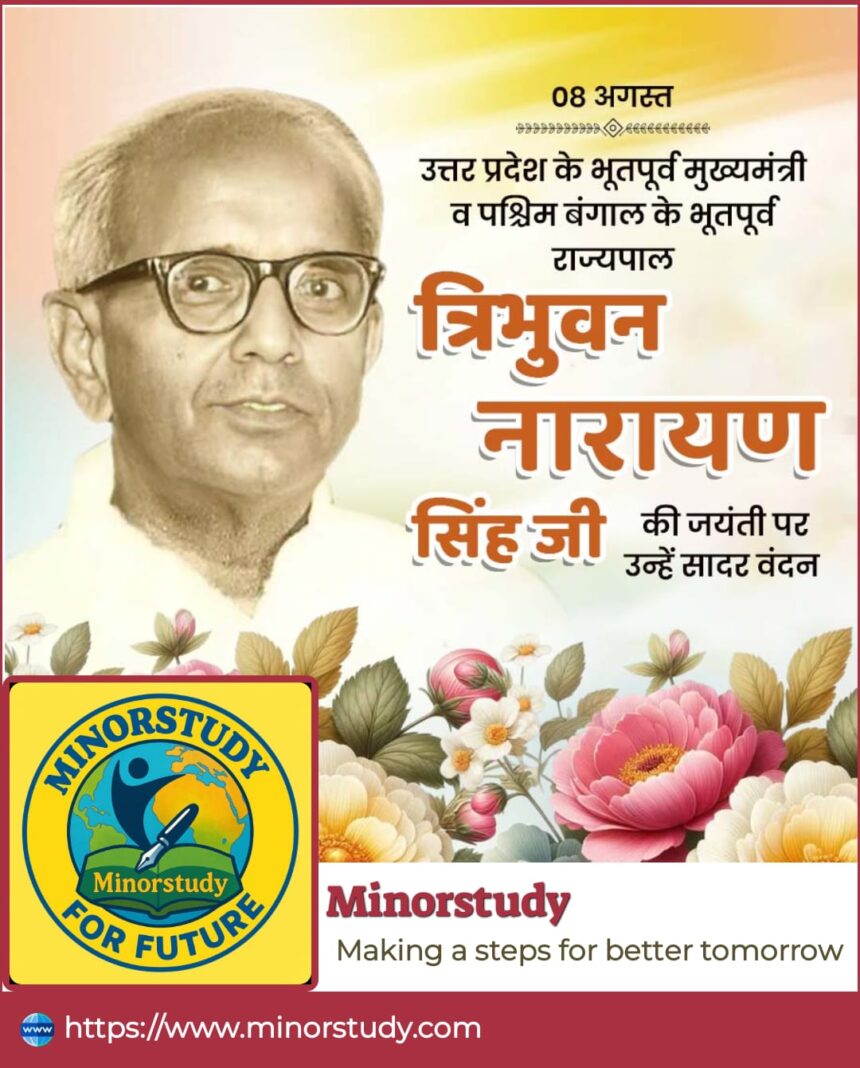Tribhuvan Narayan Singh – The Gentleman Politician of India’s Post-Independence Era
Indian politics has witnessed several towering personalities, but Mr. Tribhuvan Narayan Singh stands apart as a leader known for integrity, intellect, and a deep sense of service. From serving as the Chief Minister of Uttar Pradesh to becoming the Governor of West Bengal, Singh’s career reflected honesty and a commitment to public welfare — qualities that are rare and precious in any era.
- History of Tribhuvan Narayan Singh
- Timeline of Key Events in Tribhuvan Narayan Singh’s Life
- 7 Remarkable Facts about Tribhuvan Narayan Singh
- Significance of Tribhuvan Narayan Singh in Indian Politics
- Observance and Remembrance
- Wishing Messages to Honour His Legacy
- Importance in Our Life and Society
- Daily Life Impacts of His Principles
- FAQs on Tribhuvan Narayan Singh
- Conclusion – Why Tribhuvan Narayan Singh’s Legacy Still Matters
Let’s dive deep into his life, achievements, and the values he stood for.
History of Tribhuvan Narayan Singh
Birth and Early Life:
Tribhuvan Narayan Singh was born on August 8, 1904 in Varanasi, Uttar Pradesh. Growing up in a culturally rich environment, he was deeply influenced by India’s freedom movement.Education:
He studied at Banaras Hindu University (BHU) and later at Allahabad University, where he gained exposure to political thought and nationalist ideology.Freedom Struggle Participation:
Inspired by Mahatma Gandhi and other nationalist leaders, Singh actively participated in the Indian freedom movement, especially during the Civil Disobedience Movement and Quit India Movement. He faced imprisonment for his activism.Political Career:
After independence, he joined politics and was associated with the Indian National Congress. He served in various roles, including as a Member of Parliament (Lok Sabha), Union Cabinet Minister, and later as the Chief Minister of Uttar Pradesh.Chief Minister of Uttar Pradesh:
He served as the 15th Chief Minister of Uttar Pradesh from October 18, 1970, to April 3, 1971. His tenure was marked by administrative discipline and a focus on developmental governance.Governor of West Bengal:
Singh was appointed the Governor of West Bengal from September 2, 1979, to March 7, 1981, during a politically challenging period.Death:
He passed away on August 3, 1982, leaving behind a legacy of honesty and service.
Timeline of Key Events in Tribhuvan Narayan Singh’s Life
| Year | Event |
|---|---|
| 1904 | Born in Varanasi, Uttar Pradesh |
| 1930s–40s | Active participation in the Indian freedom movement |
| 1952 | Elected to the Lok Sabha |
| 1960s | Served as Union Minister in various portfolios |
| 1970–1971 | Chief Minister of Uttar Pradesh |
| 1979–1981 | Governor of West Bengal |
| 1982 | Passed away on August 3 |
7 Remarkable Facts about Tribhuvan Narayan Singh
Freedom Fighter at Heart – Before becoming a statesman, Singh risked imprisonment fighting for India’s independence.
Multi-Role Leader – Served as MP, Union Minister, Chief Minister, and Governor in his political career.
Focus on Clean Politics – Known for zero tolerance towards corruption during his tenure.
Strong Academic Influence – Advocated for educational reforms and was an alumnus of prestigious institutions.
Calm Administrator – Handled political instability in Uttar Pradesh with a firm yet balanced approach.
Governor during Turbulence – Managed West Bengal’s political tensions with tact and neutrality.
Respected Across Parties – Even political rivals praised his integrity and administrative capabilities.
Significance of Tribhuvan Narayan Singh in Indian Politics
Political Integrity – In an era where politics often got tainted by corruption, Singh symbolised honesty and accountability.
Administrative Excellence – His tenure was short but impactful, focusing on governance rather than mere politics.
Role in National Development – As a Union Minister, he contributed to shaping policies in multiple sectors.
Inspiration for Youth – His journey from a freedom fighter to a high-ranking constitutional authority inspires the younger generation to serve with integrity.
Observance and Remembrance
While there is no official “Tribhuvan Narayan Singh Day,” many political and academic institutions remember him through:
Seminars on Governance & Integrity – Universities and think tanks hold discussions on his leadership style.
Political Tributes – Leaders across the spectrum recall his contributions on his birth and death anniversaries.
Publications & Articles – Newspapers and journals publish retrospectives on his life.
Wishing Messages to Honour His Legacy
🕊 “Remembering Tribhuvan Narayan Singh, a leader who proved that politics and honesty can go hand in hand.”
🌿 “May his life inspire us to weave integrity into every thread of public service.”
🇮🇳 “On this day, let’s honour the legacy of a freedom fighter and statesman par excellence.”
✨ “Leaders like Tribhuvan Narayan Singh are rare — their values must never fade from our collective memory.”
Importance in Our Life and Society
Role Model for Politicians – He stands as proof that ethical governance is possible.
Educational Inspiration – Students of political science can learn from his clean and effective leadership.
Social Awareness – His life encourages citizens to demand transparency from their leaders.
Cultural Heritage – His freedom struggle contribution links us to India’s hard-fought independence.
Daily Life Impacts of His Principles
Integrity in Professional Life – His example teaches us to prioritise honesty over shortcuts.
Value of Public Service – Reminds us that true leadership is about serving people, not personal gain.
Importance of Education – Advocates for informed decision-making in governance and life.
Calm Conflict Resolution – Demonstrates that even in disputes, diplomacy and patience win.
FAQs on Tribhuvan Narayan Singh
Q1. Who was Tribhuvan Narayan Singh?
A freedom fighter, politician, and administrator who served as Chief Minister of Uttar Pradesh and Governor of West Bengal.
Q2. When was he born and when did he die?
Born on August 8, 1904, and died on August 3, 1982.
Q3. What was his political affiliation?
Indian National Congress.
Q4. What is his most notable quality?
His unwavering political integrity and dedication to public service.
Q5. Why is he remembered today?
For his clean politics, contribution to governance, and role in India’s independence movement.
Conclusion – Why Tribhuvan Narayan Singh’s Legacy Still Matters
Mr. Tribhuvan Narayan Singh’s life is a reminder that politics can be noble when driven by purpose rather than power. His dedication to transparency, fairness, and service offers a blueprint for ethical leadership in India.
In today’s political climate, where trust is often eroded, Singh’s example is like a fresh breath of honesty. His life tells us that positions are temporary, but principles are permanent. Whether you are a politician, student, or citizen, his values can guide your choices and strengthen our democracy.









Great post but I was wondering if you could write a litte more on this subject? I’d be very thankful if you could elaborate a little bit more. Thanks!